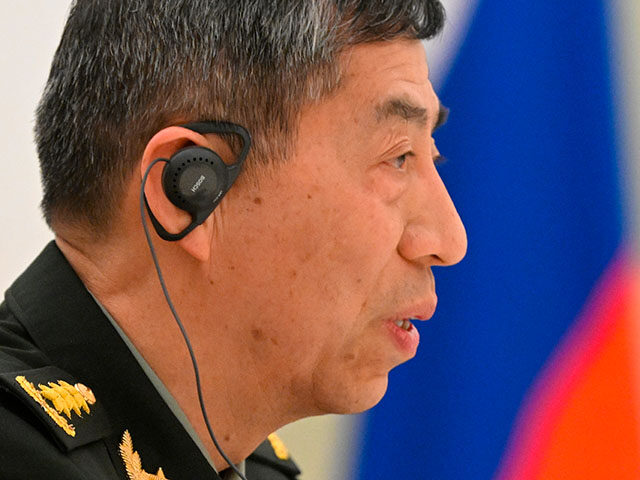Chinese Defense Minister Li Shangfu arrived in Russia on Monday to attend the Moscow Conference on International Security and has plans to visit the allied tyranny of Belarus during his week-long trip.
The visit is a show of support for the Chinese-Russian alliance, which has reportedly been strained in recent weeks by Russia’s grueling war in Ukraine.
The Chinese Defense Ministry said Li will visit Belarus at the invitation of Russian Defense Minister Sergei Shoigu and Belarusian Defense Minister Viktor Khrenin. The trip will mark Li’s first visit to Belarus, and his second to Russia, since he became China’s Defense Minister in March 2023. Li is the first Chinese Defense Minister to visit Belarus since Russia invaded Ukraine last year.
Li has met with Shoigu three times since taking office but has yet to officially meet with U.S. Secretary of Defense Lloyd Austin.
Li has been under U.S. sanctions since 2018 when he was head of the Equipment Development Department of the People’s Liberation Army (PLA). Li was designated under the Countering America’s Adversaries Through Sanctions Act (CAATSA) for purchasing SU-35 combat aircraft and S-400 surface-to-air missiles from Russia.
The U.S. State Department said at the time that CAATSA sanctions “do not necessarily prohibit sanctioned persons from meeting with U.S. government officials,” so they would not hinder Li from participating in “deconfliction talks” with the United States. The sanctions banned Li from obtaining a U.S. visa or visiting the United States.
In May 2023, the State Department insisted it would not lift sanctions against Li after President Joe Biden made ambiguous remarks suggesting that such a move was “under negotiation right now.”
“China always firmly opposes illegal unilateral sanctions and has made clear its stern position to the U.S. side. The U.S. side should immediately lift sanctions and take concrete actions to remove obstacles, create favorable atmosphere and conditions for dialogue and communication,” the Chinese Foreign Ministry demanded in May.
Li himself has said he will not hold meetings with his American counterparts until the sanctions against him are lifted.
“During his visit to Belarus, [Li] will meet and hold talks with Belarusian state and military leaders, and visit Belarusian military units,” Defense Ministry spokesman Col. Wu Qian said.
Li met with Shoigu upon arriving in Moscow on Monday. The two ministers pledged closer cooperation, more sharing of military technology, and renewed efforts to support each others’ “core interests.”
According to Russian state media, the 11th Moscow Conference will “discuss global stability amid the emerging multipolarity, cooperation between defense ministries of various countries as well as military aspects of regional security in Europe, Asia, Latin America, the Middle East and Africa.”
“Independent experts, including from the West, will take part in the conference that will be held on August 15,” Russia’s Tass news service said on Monday.
Li is one of the featured speakers at the conference. Another is Russian Foreign Minister Sergey Lavrov, whose topic is “Majority World countries search for ways to develop outside Western mechanisms.”
“Majority World” is Russia’s propaganda idea that most of the world’s population supports Russian and Chinese authoritarianism over Western democratic ideals. According to polls, Russia and Putin are in fact dismally unpopular across much of the globe since the attack on Ukraine caused economic disruptions and food shortages.
The Russian Foreign Ministry said the Moscow Conference will “discuss various aspects of security in the conditions of the establishment of a multipolar world order, ways to restore constructive international cooperation in the context of aggressive claims by Euro-Atlantic elites for world domination.”
“Li’s attendance at the conference further underscores the drive by China and Russia to align their foreign policies in a bid to undermine the Western-led liberal-democratic world order, despite their economic and reputational costs,” the Associated Press (AP) suggested.
Chinese Foreign Ministry spokesman Wang Wenbin said on Monday that Chinese dictator Xi Jinping and Russian strongman Vladimir Putin “maintain a continuous strategic dialogue in various formats.”
“We have a busy agenda in all areas,” Wang said. “China and Russia will continuously develop comprehensive strategic partnership in a new era.”
Wang might have felt compelled to make this statement after rumors last week that Xi is growing impatient with Putin’s bloody-minded insistence on continuing his Ukraine invasion. China has been frantically attempting to position itself as a peacemaker by pushing a “12-point plan,” but Putin and other top Russian leaders hold Beijing’s proposal in thinly-disguised contempt.
Russia also needled China for attending Ukraine peace talks in Jeddah, Saudi Arabia last week. Some Western diplomats said China’s presence at a conference openly disdained by Moscow was a sign of growing tension between them.
The Ukrainians hailed China’s presence at the Jeddah talks as a “huge blow” to Russia, since China is Russia’s only remaining major-power ally. China was probably more interested in developing its budding relationship with Saudi Arabia and maintaining a positive image with the developing nations of the “Global South,” who have been impacted greatly by the disruptions of the Ukraine invasion.

COMMENTS
Please let us know if you're having issues with commenting.